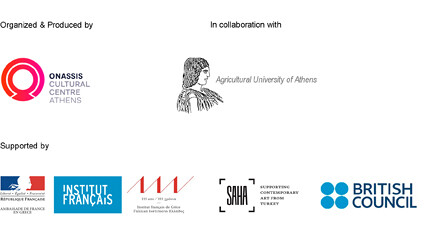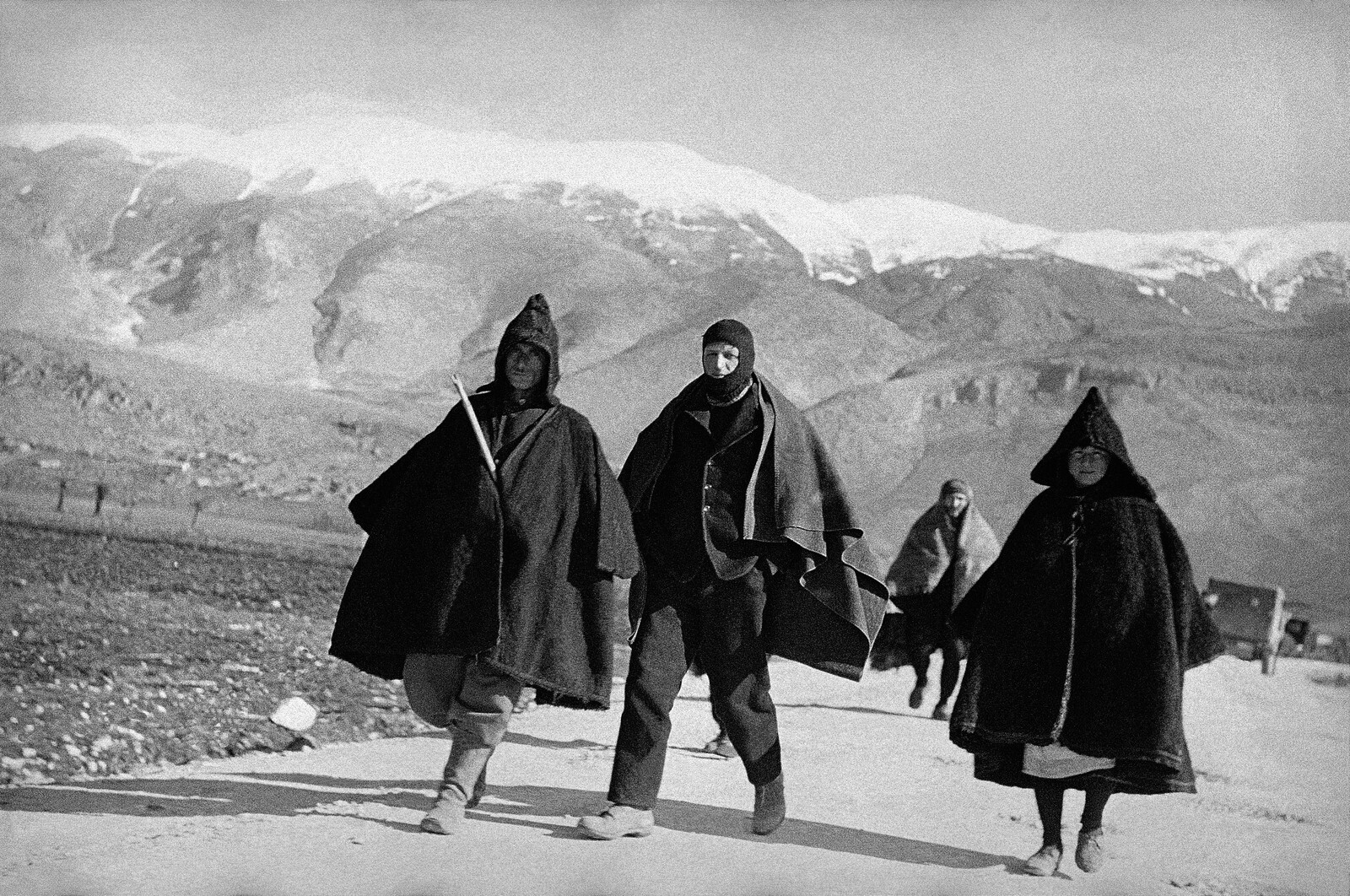Or how we measure ourselves vis a vis the earth
March 27–June 15, 2018
Produced / organised by the Onassis Cultural Centre-Athens
Curated by locus athens
In collaboration with the Agricultural University of Athens
Architectural design & signage: AREA, Architecture Research Athens
The Onassis Cultural Centre in a project curated by locus athens aims to reintroduce the Agricultural University to Athenians, inviting them to discover one of the country’s first academic institutions as a relevant and necessary oasis within the urban landscape.
Draw a vertical line across a horizontal one. Man and Earth. These axes measure the sum of our story. From earth, upwards and onwards; the earth as a beginning and end, and in between the possibility of marking and framing everything we know. As we scratch the surface, hunt, gather, cultivate, grow, carve into and extract from, staking our power and politics, we shout out our own existence in continuum; this is an exhibition that explores humanity’s increasingly complex relationship to its standing ground.
Geometries unfolds in the gardens, museum and central building of the Agricultural University in Athens. Founded in the 1920’s, the University is synonymous with new models of large scale farming, engineered to feed a primarily agricultural but poor nation and to establish food security. In parallel with radical agrarian reforms aimed at incorporating refugees of that period into the social fabric, the University provided a scientific approach to agricultural production.
Set in these grounds, the exhibition investigates this anthropocentric promise of modernity, asking instead whether we can step out of our knowledge systems and networks and re-imagine ourselves at one with our surroundings. Exploring the straight-jacket dyad of humanity and nature, we ask whether we can see our cultural landscapes without domination or ownership and live in ambiguity on this fragile earth; to try and recalibrate the scales and be witnesses of a world where (wo)man kind and other kinds live in kindness together. To understand that the scientific systems that are the logical development of the agricultural revolution, and with whose tools, words and weapons we have fortified ourselves from ‘the wild’, might now be used for a new discussion based on shifting grounds.
Starting with an investigation on site and into the history of the University, and learning from the diverse knowledge produced through the University’s academic and student community and its grounds, the exhibition will both look down at our footprint on this earth and up to the sky as we listen to stories about small-scale farming, cyclical resources, the mapping of geographies, our dark earth and indigenous knowledge, whilst connecting the local and the global in an attempt to better understand our proximity.
Geometries is a meditation on who we are and where we are, together as humans or humus. For lack of a better word. For lack of a better world.
Contributors:
Omar Amiralay, Will Benedict, Tristan Bera, Anna Boghiguian, Yto Barrada, Yannis Baziotis, Penelope Bebeli, Michel Bertet, Betty’s Bakery, Ursula Biemann, Wang Bing, Natasa Biza, Vlassis Caniaris, Carolina Caycedo, Chouska, Christos Chrissopoulos, Céline Condorelli, Dora Economou, Metin Erksan, Eparkeia, Cevdet Erek, Alekos Fassianos, Jorge Furtado, Angelos N. Goulandris, Inas Halabi, Peter Halley, Federico Herrero, Athina Ioannou, Takis Kanellopoulos, Valentina Karga, Kassandras, David Leonard, Miltos Manetas, Yannis Manetas, Sakis Maniatis, Jumana Manna, Nikos Markou, Angela Melitopoulos, Petros Moris, MoY Studio, Beatriz Santiago Muñoz, Peter Nadin, Iris Nikolaou, Dora Oikonomou, Uriel Orlow, Christodoulos Panayiotou, Maria Papadimitriou, Voula Papaioannou, Andriana Papanikolaou, Véréna Paravel, Nausica Pastra, Rena Papaspyrou, Didem Pekün, Artavazd Pelechian, Marjetica Potrč, Filipa Ramos, School of Soil, Vittorio de Seta, Stagones, Standart Thinking, Serkan Taycan, Lucien Castaing-Taylor, Hiroshi Sugimoto, to Peliti, Roikos Thanopoulos, Aimée Toledano, Thanasis Totsikas, Mario García Torres, Yannis Theodoropoulos, Troō Food Liberation, Yorgos Tsemberopoulos, Rebekka Tsiligaridou, Natsuko Uchino, Ana Vaz, Dimitris Zenghelis, Fay Zika, Paki Vlassopoulou
The public program of Geometries is divided into seven themes—salt, fire, gardens, seeds, water, earth and air—within which numerous events will take place: workshops, cooking sessions, food, talks, recordings, screenings, performances, walks and readings amongst other things. Throughout the public program Athenians will be invited to discover known and unknown aspects of the University—the vineyard, the orchard, the botanical gardens, whilst becoming living participants in the University’s constantly evolving history from Ottoman times till now. Visitors will have the chance to learn alternative farming practices, discover hands on the philosophy of building from earth, meditate on the history of stones, discover new ways of communing food, gain insights into the history of man’s own evolution set off by the agricultural revolution, focus on climate change as well as be immersed in many more vital facets of our natural world.
The Onassis Foundation was established in December 1975 in accordance with Aristotle Onassis’ last wish to honor the memory of his son, Alexander. It was created to support Greek society in the crucial areas of education, culture and health. The Onassis Cultural Centre-Athens (OCC-Athens) is a creative hub for artists, audiences and ideas, which hosts events and actions across the whole spectrum of the arts from theatre, dance, music, cinema and the visual arts to digital and hybrid art and the written word. It showcases contemporary cultural expression, supports Greek artists, cultivates international collaborations, explores the boundaries between science, art and society, and promotes lifelong learning for people of all ages. A home for innovation in contemporary culture, engaging both Greek and global communities.
locus athens is an independent contemporary arts organization run by Maria-Thalia Carras and Olga Hatzidaki. locus athens is primarily interested in urban and public spaces through which new narratives occur in dialogue with contemporary art. locus athens constantly seeks to broaden its approach through new productions based on investigations into the historical, political and cultural complexities of our locality and the broader region; in order to expand the conversation between contemporary art and the public sphere.



